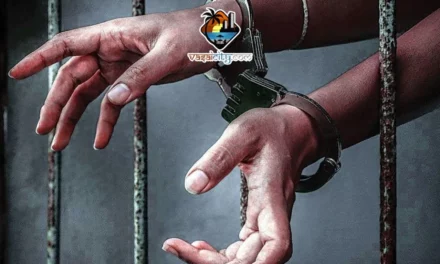It was a quiet Wednesday evening in Kaman, a small area in Vasai East, when something heartbreaking came to light. A 27-year-old man named Shrey Agarwal was found dead inside a bungalow. When the police arrived, they discovered his body tied to an open gas cylinder. They believe he passed away due to carbon monoxide poisoning—a gas you can’t see or smell, but one that can take a life silently.
Shrey wasn’t just anyone passing through Vasai. He worked at a bank in Mumbai and had been calling that bungalow his home for the past year. Living alone can be peaceful for some, but for Shrey, it seems it was a lonely time too. The police found a note he left behind—a suicide note. In it, he poured out his struggles. He’d been dealing with two serious health problems, and despite trying different treatments, nothing seemed to make him feel better. It’s hard to imagine how tough that must have been for him, feeling like there was no way out.
His family, who live in Powai, hadn’t heard from him for a while. They tried calling, but Shrey didn’t pick up. Worried, they told the police he was missing. That’s what led the authorities to the bungalow in the first place. When they got there, it wasn’t just one gas cylinder they found—there were four in the room. On the door, Shrey had left a warning note about the carbon monoxide, maybe to make sure no one else got hurt. It’s a detail that shows he was thinking about others, even in his final moments.
The police have taken his body for a postmortem, which is a medical check to figure out exactly what happened. They’re also looking into his health history to see what he was going through. Vijay Kadam, the senior inspector at Naigaon police station, shared some of these details with us. He said the note made it clear Shrey felt overwhelmed by his illnesses.
Shrey’s story has left a heavy feeling in the air around Vasai. People who knew him—friends, neighbors—say he was a quiet guy. He didn’t talk much about himself, and it seems no one really knew how much he was hurting. It’s the kind of thing that makes you stop and think. Sometimes, the people who seem okay on the outside are carrying something really heavy inside.
Let’s talk about Shrey for a minute. He was 27—just starting out in life, you’d think. Working at a bank in a big city like Mumbai sounds like a solid job. Maybe he had dreams, plans, things he wanted to do. But when your health starts slipping away, and nothing you try fixes it, that can weigh on you in ways others might not see. Living alone might have made it harder too—no one to notice if he was having a rough day or to sit with him when things got dark.
The bungalow in Vasai East where this happened isn’t some busy spot in the city. Kaman is quieter, a place where people might go to get away from the rush of Mumbai. For Shrey, it was home, but it also became the place where his story ended. When the police walked in, they must have felt the stillness of it all—the cylinders, the note, the warning on the door. It paints a picture of someone who’d made up his mind, even if it’s painful to think about.
His family in Powai must be going through so much right now. Losing someone is tough enough, but finding out it happened like this? That’s a different kind of hurt. They’d been worried when he stopped answering their calls—maybe they sensed something wasn’t right. Families often have that instinct, don’t they? Now, they’re left with memories of Shrey and a lot of questions that might never get answered.
This whole thing makes you wonder about the people around us. How many are quietly struggling, putting on a brave face? Shrey’s neighbors didn’t seem to know much about what he was dealing with. Maybe he didn’t want them to. Or maybe he didn’t know how to tell anyone. Either way, it’s a reminder that checking in on people—even just a quick “How are you?”—can mean more than we realize.
Mental health isn’t something we talk about enough, especially when it’s tied to physical problems like Shrey’s. When your body isn’t working right, it can mess with your mind too. Doctors can give you medicine, but if it doesn’t help, where do you turn? Shrey’s note said he tried, but it wasn’t enough. That’s a lonely place to be.
The police are still piecing things together. They’ll look at the postmortem results and dig into his medical records. It’s their job to figure out the facts—like whether the carbon monoxide was definitely what took his life. But beyond the investigation, there’s a bigger story here. It’s about a young man who felt like he’d run out of options.
As a community, moments like this shake us up. Vasai might be a small part of the world, but it’s feeling this loss right now. People are talking, reflecting, maybe even reaching out to their own friends and family a little more. It’s not just about what happened to Shrey—it’s about what we can do so others don’t end up in the same place.
If you’re reading this and you’re struggling, please know you’re not alone. There are people out there who want to help—friends, family, even helplines you can call. It’s okay to say you’re not okay. And if you know someone who’s been quiet lately or seems off, take a second to reach out. You don’t have to fix everything for them—just let them know you’re there.
Shrey’s life ended in that bungalow, but his story doesn’t have to end with silence. We can learn from it, talk about it, and maybe make things a little better for someone else. For now, our hearts go out to his family and everyone who knew him. They’ve got a tough road ahead, and we hope they find some comfort in the days to come.
Let’s keep this in mind as we go about our days. A simple conversation, a kind word—it might not seem like much, but it could be everything to someone who’s struggling. Shrey’s gone, but we’re still here, and we can make a difference.














